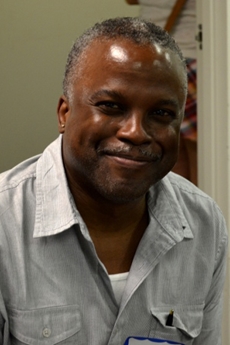Social Work Doctoral Student Spotlight: Improving mental health outcomes for female veterans

Markus Whitehead
Improving mental health outcomes for female veterans
Professional Biography
A clinical social worker and 35-year veteran of the Ohio Air National Guard, Markus has for two decades provided mental and behavioral health counseling in military and community-based settings as well as court supervision of offenders on community control. As a member of the Ohio Air National Guard, his monthly responsibilities involved the supervision of a clinical laboratory and a mental health clinic serving both active duty and reserve members of the armed forces. He also served military members, including women veterans experiencing mental and emotional challenges as a result of work-related and other life stressors. Concurrent to his military service, during which he received two non-commissioned officer of the year awards and an Air Force Commendation Medal, Markus has practiced throughout the greater Toledo area with a variety of populations. From 1993 to 2005, he facilitated sex offender and anger management treatment groups at Unison Behavioral Health Group and later at Harbor Behavior Healthcare. He also provided individual and family therapy and served as the attention-deficit/hyperactivity disorder group coordinator. Markus also conducted psycho-social assessments, facilitated Intensive Outpatient Program groups, and conducted individual and family sessions at Arrowhead Behavioral Healthcare. At present, he works at Urgent Care Counseling Center, LLC, a private practice counseling center for which he conducts clinical assessments and provides individual and family therapy. Since 2001, Markus has worked as a probation officer for a local municipal court. In this role, Markus conducts pre-sentence investigations, supervises a high-risk male caseload using cognitive behavioral therapy and other evidence-based practices, and works with veterans pursuing alternatives to sentencing under the local Veterans Treatment Court. Markus, who earned his B.S.W. at Lourdes College in Sylvania, Ohio, and his M.S.W. at Eastern Michigan University, was selected in 2011 for the "Bridges to the Doctoral Program," a research training grant funded by National Institutes of Health and run through a collaborative effort among Eastern Michigan, University of Michigan and California State University. The program prepares master's-level, underrepresented social work students for Ph.D. studies with an emphasis on health disparities research. His participation and work with the Bridges to Doctoral Program led to a published research article highlighting the challenges and experiences of females serving in the United States armed forces.
Research/Dissertation
Markus has an extensive family history of military service that includes his late father, who served in the United States Air Force for 20 years, two sisters and two brothers in Air National Guard and active duty Air Force, and a sister-in-law, nephew and niece currently serving in the military. He plans to pursue research exploring mental health disparities among women veterans, specifically African American women veterans. Chief among his research interests are why fewer women combat veterans are diagnosed with post-traumatic stress disorder despite presenting with more symptoms of PTSD, what risk and protective factors may explain their mental health outcomes, and how the mental health of women in the military is affected by their efforts to achieve work-life balance. Noting that African American women in the military may experience stress related to race as well as to gender, Markus also plans to examine the experience of women veterans at the intersection of multiple types of discrimination or harassment.
Why It's Important
As more women are now serving in the military and working in occupations once reserved for men, their exposure to sexual harassment and assault has increased. Further, prolonged absences from their partners and children may lead to increased stress as it relates to their roles as caregivers. But while there is a robust body of research examining mental health outcomes among male veterans, more research is needed on the experiences and mental health outcomes of female veterans, notes Markus. "Research applying a social work's lens of systems change can help level that playing field by promoting policies that ensure the overall environment and day-to-day operations of the military are not gender-neutral, but reflect the unique needs, concerns and circumstances of both women and men," Markus said.
Faculty Support
Doctoral Program Director Faith Hopp, who serves as Markus' faculty advisor, said the "commitment to service, collaboration, and quest for knowledge that Markus has demonstrated during his military service have transferred well into his civilian career as a Ph.D. student. Between his military experience and academic training, he is well prepared to contribute to research and practice around issues of combat veterans' mental health, which is highly relevant to the social work profession." Markus also hopes to help shape policy related to these issues, and has contributed to research with Assistant Social Work Professor, Clinical Shirley Thomas on military families and children. He credits Assistant Social Work Professor Angelique Day for his interest in pursuing military policies that will lead to decreasing and ultimately eliminating sexual assault and harassment within the armed forces. He acknowledged the support and respect of the Social Work faculty as being instrumental in his success at Wayne State University. "The Social Work faculty are very knowledgeable and helpful, and they have an advocacy ethic that transcends their teaching," Markus said. "Wayne State is the perfect fit for me."
To read about other social work doctoral students and the research they are pursuing, click here: http://socialwork.wayne.edu/phd/student-spotlight.php